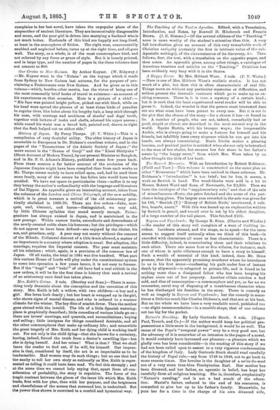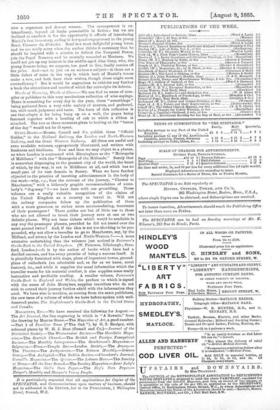Nature's Nursling. By Lady Gertrude Stook. 3 vols. (Kogan Paul,
Trench, and Co.)—If the author would keep her political pre- possessions a little more in the background, it would be as well. The cause of the Pope's "temporal power" may be a very good one, but the advocacy of it is somewhat of an intrusion in the pages of a novel. It would certainly have increased our pleasure—a pleasure which we gladly own has been considerable—in the reading of this story if we had not been called upon to assent to a very vigorous condemnation of the kingdom of Italy. Lady Gertrude Stock should read carefully the history of Papal rale,—say from 1748 to 1848, not to go back to more remote times. Her heroine is the daughter of a ne'er-do-weel son of a very stern true-blue Presbyterian Earl. Her mother has been divorced, and her father, an agnostic in belief, has kept her carefully from all religious teaching. She is, therefore, emphatically "Nature's nursling," and is not a bad result of the educa- tion. Muriel's father, reduced to the end of his resources, is compelled to give her up to his father's family. Meanwhile, he pate her for a time in the charge of his own divorced wife,
now a repentant and devout woman. The arrangement is ex- traordinary, beyond all limits permissible in fiction ; but we are inclined to overlook it for the opportunity it affords of introducing Muriel's Bret love-story, ending in her quasi-engagement to the young Rene, Vicomte du Chatelet. Rene is a most delightful young lover, and we are really sorry when the author thinks it necessary that he should be inspired with a mission to defend the Temporal Power, join the Papal Zonaves, and be mortally wounded at Mentana. We could not get up any interest in the middle-aged Alan Gray, who, the young Zonave being, we suppose, too good to live, finally carries off the prize. And—not to jest on so serious a subject—is there not a
little defect of taste in the way in which both of Muriel's lovers make a vow, and both have their wishes, though these might seem contradictory ? But it would be ungracious to criticise any further a book the attractions and merits of which far outweighs its defects.



































 Previous page
Previous page